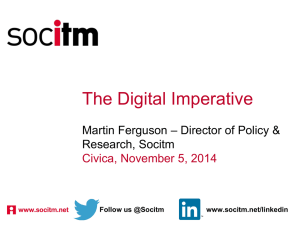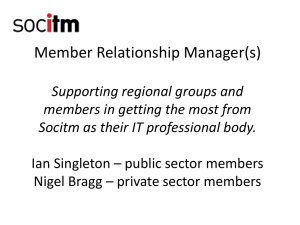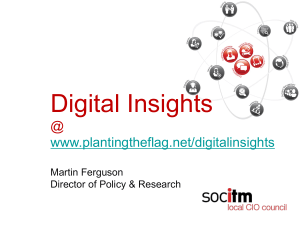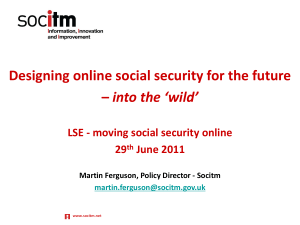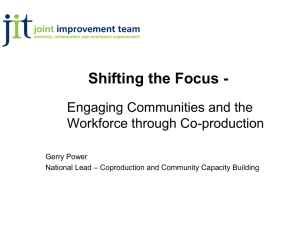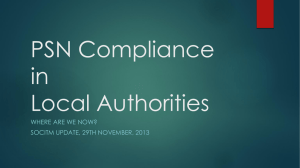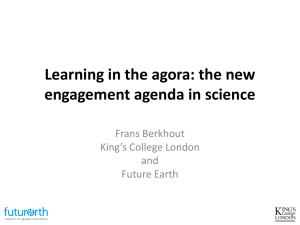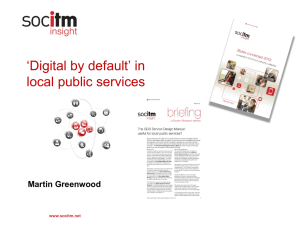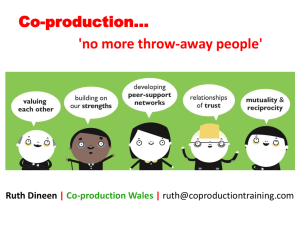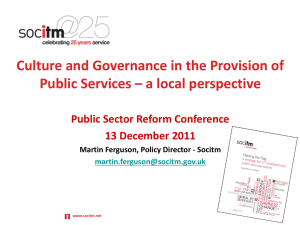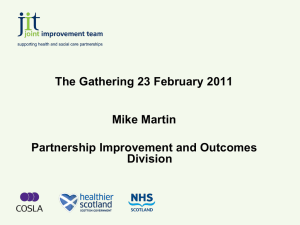Public service delivery: how can we raise the bar? Martin Ferguson
advertisement
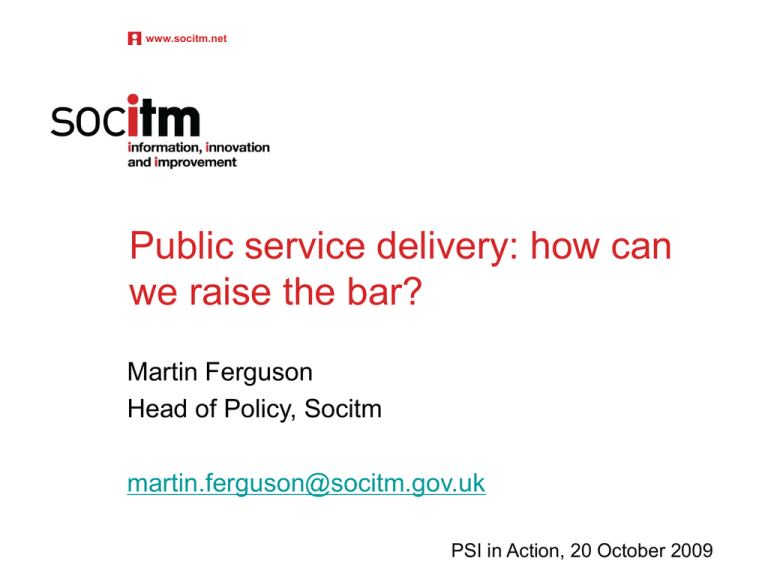
www.socitm.net Public service delivery: how can we raise the bar? Martin Ferguson Head of Policy, Socitm martin.ferguson@socitm.gov.uk PSI in Action, 20 October 2009 Tomorrow‟s public services – raising the bar Themes 1. Shift towards co-production of information and services 2. Citizens „at the heart‟ of new service designs 3. New boundaries and freedoms for information 4. Emerging role of social media Some sources: www.socitm09.net www.opensocitm.com www.socitm.net Tomorrow‟s public services – do we have a vision? The Council of the Future™ Digital access to end to end services Customer service staff use same system for mediated access Maximise information held and managed digitally Staff and resources used better – mobile, flexible working From „citizen-centred‟ to „citizens at the heart‟ of service and accountability www.socitm.net Tomorrow‟s public services Channel shift -> „digital switchover‟ • Digital Britain - simple, commoditised, transactional services • OK, but need for a more sophisticated view: - service needs/complexity - preferences/willingness of citizens to participate • Implications for service design, information handling, communications channels and technology mix www.socitm.net high Digital ‘garage’ - expert Digital ‘surgery’ – coproduction Digital „bank‟ - producer Digital „supermarket‟ consumer low Service needs/complexity Typology of digital public services low high Preferences/willingness of citizens to participate www.socitm.net Co-production – challenges • Intensifying and systematising co-production of services by citizens and other users • Getting to and gaining permission to be included into the centre of where citizens want to do more • Improving awareness of what co-production is taking place • Sharing know-how about how to support coproduction • „Doing the stuff‟ of co-production! www.socitm.net Co-production – creating Principle – “empowering health workers and patients to be creative with information” e.g. www.sundhed.dk www.patientsknowbest.com Opening up access and communications for patients to: - their records - doctors - consultants - information – treatments, care, etc www.socitm.net Co-production – virtual visiting Principle – “different ways of working, thinking and behaving with information” • Telesupport services connecting people in their homes to family, friends and social care staff e.g. people with learning difficulties, dementia and other obstacles to independence • Gaming e.g. virtual house to train care workers in hazard awareeness; webcam-led games to help stroke recovery in the home www.socitm.net Co-production - mapping Principle – “working across organisational boundaries with information” “For the first time, it's realistic to dream of accessing info and services across geog boundaries from the perspective of location - we see tools like Googlemaps and FixMyStreet make it so easy for citizens. But licensing barriers make it difficult both for local authorities and community developers. And as far as I am aware no-one is telling/funding authorities to open their data/join themselves up in this way.” www.socitm.net Co-production – targeting, preventing Principle – “using customer insight information” „Hyper-local‟ e.g. Total Place pilot – Birmingham City • Identify customer groups by needs (segmentation) • Service delivery framework • Segment-specific service solutions www.socitm.net Co-production – consulting, involving Principle – “enhancing the democratic process between elections” National local e-democracy project e.g. Bristol City Council • Citizens‟ panel • Consultations • E-petitions • Viewfinder • Webcasting www.socitm.net Co-production – empowering communities Principle – “citizens/businesses/customers at the heart of creating and exploiting information” Emerging role for social media: • Early adopters – Wave and Twitter • Middle majority – Facebook and email • Later adopters – simple text interface Strengthen communities, build capacity for mutual support e.g. pledge banks for environmental maintenance …. social care? municipedia? www.socitm.net Implications for the information landscape Are we ready for: • new ways of creating and gathering information? • new boundaries around what can and can‟t be done with information? • new freedoms to access and use information? • new methods of communicating and sharing information? • information revolving around the citizen and their needs? www.socitm.net “YES” means we can raise the bar to: • doing different things • preventing and intervening early rather than treating the consequences • being a public servant • going beyond self-service to positively encouraging self-organisation and development • being more transparent and open • starting from a position of trust ..... and ..... • redesigning rather than simply modifying public service delivery www.socitm.net
